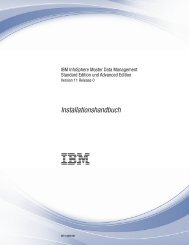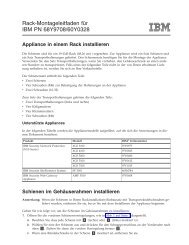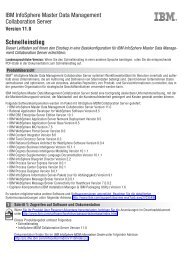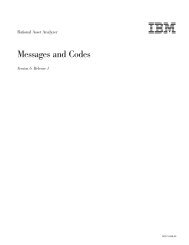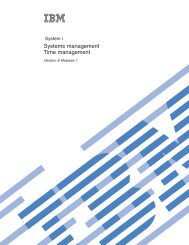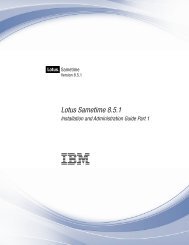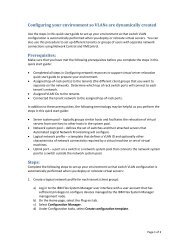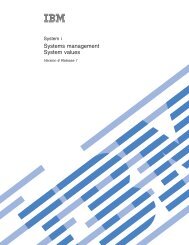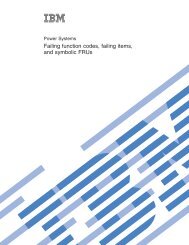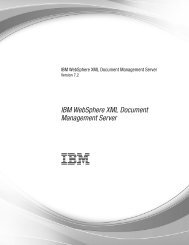System i: Programming Secure Sockets APIs - IBM
System i: Programming Secure Sockets APIs - IBM
System i: Programming Secure Sockets APIs - IBM
You also want an ePaper? Increase the reach of your titles
YUMPU automatically turns print PDFs into web optimized ePapers that Google loves.
struct SSLInitAppStr { /* SSLInitAppStr */<br />
char* applicationID; /* application id value */<br />
unsigned int applicationIDLen; /* length of application id */<br />
char* localCertificate; /* local certificate */<br />
unsigned int localCertificateLen; /* ength of local certificate */<br />
unsigned short int* cipherSuiteList; /* List of cipher suites */<br />
unsigned int cipherSuiteListLen; /* number of entries in<br />
the cipher suites list */<br />
unsigned int sessionType; /* the type of application as<br />
registered */<br />
unsigned int reserved1; /* reserved - must be 0 */<br />
unsigned int protocol; /* SSL protocol version */<br />
unsigned int timeout; /* cache timeout (seconds) */<br />
char reserved[12]; /* reserved - must be NULL (0s)*/<br />
};<br />
The fields within the SSLInitApp structure as pointed to by init_app are defined as follows:<br />
char *applicationID (input)<br />
A pointer to a null terminated character string identifying the application identifier value that<br />
was used to register the application using the Register Application for Certificate Use, (OPM,<br />
QSYRGAP; ILE, QsyRegisterAppForCertUse) API. See the Register Application for Certificate Use<br />
API for information about the format and values allowed for the application identifier.<br />
char *applicationIDLen (input)<br />
The number of characters in the application identifier string as specified by the applicationID<br />
parameter.<br />
char *localCertificate (input)<br />
On input, the localCertificate pointer must be set to point to storage that has been allocated by<br />
the calling application that will be used on output to contain the application’s registered local<br />
certificate. If a certificate is not to be returned then set this pointer’s value to NULL and the<br />
localCertificateLen value to zero (0). The storage should be large enough to accomodate the size<br />
of the certificate. Most certificates are less than 2K in length. On output, the localCertificate<br />
pointer will not be changed, though the storage it points to will contain the registered<br />
application’s certificate. The certificate will be the one registered for that application by the<br />
Register Application for Certificate Use (OPM, QSYRGAP; ILE, QsyRegisterAppForCertUse) API.<br />
See the Register Application for Certificate Use API for information about the format and values<br />
allowed for the application identifier.<br />
unsigned int localCertificateLen (input)<br />
On input, this value must equal the number of characters available in the storage pointed to by<br />
the localCertificate pointer. Set this value to 0 if you do not want a certificate returned by this<br />
API. On output, this value is equal to the length of the certificate. If the certificate will not fit into<br />
the storage provided, then this value will be set to the length required to contain the certificate.<br />
unsigned short int* cipherSuiteList (input)<br />
A pointer to the cipher specification list to be used during the SSL handshake protocol for this<br />
job. This list is a string of concatenated cipher specification values. A cipher specification value is<br />
an unsigned short integer. Any value provided will override any values provided by a previous<br />
SSL_Init_Application() API or SSL_Init() API or the system default cipher specification list if the<br />
previous SSL_Init_Application() API or SSL_Init() API did not provide a cipher specification list. A<br />
value of NULL for this parameter indicates one of the following:<br />
v Use the cipher specification list provided by a previous SSL_Init_Application() API or SSL_Init()<br />
API<br />
<strong>Secure</strong> <strong>Sockets</strong> <strong>APIs</strong> 85



